Author Archives: Pamela Rafalow Grossman
March 8, 2018 by Pamela Rafalow Grossman
May Her Memory Be For a Blessing: A Tribute to Cynthia Heimel
If you heard traces of a collective gasp a few days ago, it may have been related to the news that writer Cynthia Heimel had died. She was 70 years old—far below an age where her fans might have been prepared for this. joker123
The cause of death was early-onset dementia. She had not published much at all in recent years; but she’d been prolific in the past, and it had seemed a reasonable hope that she’d just decided to turn her energies elsewhere, at least for a while.
I knew that I love Heimel’s work, and I knew that the women to whom I’ve given her books over the years (“This. You have to read this!”) love it too. But I didn’t know, until she died, how many fans she has among my acquaintances. Though she left the public eye, her trailblazing writing about everything from offices to orgasms remained and remains widely cherished. She was a humorist, and she was funny; but like the best wits, she was also profound.
An assignment to highlight some of the wisdom and advice from Heimel’s work brings with it a major problem: Her books are so absorbing that they’re hard to skim. Indeed, my friend Janet remembers poring over Heimel’s columns in the SoHo Weekly News (where she worked in the 1970s, before she became a regular columnist at The Village Voice) as someone might read Talmudic text. I’ve been wrapped up in Heimel’s writing for a few days now. So many of her insights were prescient; others were simply timeless.
Given the intimate and openhearted qualities of her work (her first book, 1983’s Sex Tips for Girls, cheerfully offers many actual, detailed, and honestly useful sex tips), Heimel came across as a very best friend; and she leaves behind masses of readers who feel personally bonded to her. I met her once, in the 1990s, and she was as amazing as I’d hoped; I only wish I’d gotten to hang with her a million times. “No human (or dog) is an island, we need each other desperately, we need to be needed desperately,” she wrote in an essay about the false equating of singlehood and loneliness. “But to listen to the propaganda, to pin all our hopes on husbands or wives and nuclear families, is self-defeating. To find love, give up searching. Just look right in front of you.” I hope she felt fully the truth of these words. We love you, Cynthia Heimel, and we always will.
- No Comments
December 30, 2016 by Pamela Rafalow Grossman
Menorahs, Mittens, and Freecycling
As I celebrate Hanukkah—and look to January with trepidation—I am thinking of a story from a year ago that reminds me of the strong spirit of this holiday and, more broadly, of the power of community and connection. As long as our hearts remain open, to strangers as strongly as to loved ones, it will be harder for anyone to tear this country apart.
Last December, I saw something on Freecycle that I could not ignore. Freecycle is a great listserv—national, but divided into regional groups—that allows people to post what they have and don’t need or need and don’t have. Baby clothes, electronics, leftover construction materials, and furniture are some items frequently exchanged, all for free. This allows for decluttering, cost saving, and, of course, the many environmental benefits of reusing whatever is reusable.
- No Comments
June 22, 2016 by Pamela Rafalow Grossman
What Six Words on a Necklace Meant During My Recovery from Breast Cancer
It was the beginning of 2009. I had recently finished active treatment for breast cancer; I had also recently reconnected with a dear friend from college, Marla Wallerstein.
Marla went to the art school of our university and was known for her combination of beauty, humor, and creativity, in everything from her class assignments to her outfits to her presence as a friend. It made sense to find that she’d begun making gorgeous jewelry. She chose as part of her work’s mission to update traditional Jewish-themed pieces (large chai necklaces and the like). She jokes that she decided to take on this task “because someone has to”—but in all seriousness, the objects she creates based around Jewish texts and Jewish faith are quite stunning.
“I design, cut, hammer, rivet, etch, and solder to create each piece,” she explains on her website. “More than a labor, it’s love.”
Marla chooses for these pieces Hebrew words or parts of prayers that particularly resonate with her. “With all your heart soul might” is etched on a necklace (English on one side, Hebrew on the other). “Where you go, I will go.” “Faith.” “Shemah.”
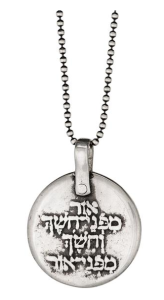 Though not surprised by the quality of Marla’s work when I saw it in photos, I was quite surprised when one of her creations arrived at my door, from her studio in Chicago, soon after we’d re-found each other. It’s a round silver pendant on a silver chain. Again in Hebrew and in English, it bears the etched inscription, “Light before darkness, darkness before light”—part of a text referring to the beginnings of the world: “He createth day and night, causing the light to recede before darkness and darkness before light.”
Though not surprised by the quality of Marla’s work when I saw it in photos, I was quite surprised when one of her creations arrived at my door, from her studio in Chicago, soon after we’d re-found each other. It’s a round silver pendant on a silver chain. Again in Hebrew and in English, it bears the etched inscription, “Light before darkness, darkness before light”—part of a text referring to the beginnings of the world: “He createth day and night, causing the light to recede before darkness and darkness before light.”
Marla was telling me that after the darkness of the diagnosis and treatment would come light again; and she was right. In fact, I would realize later, the seeds of the coming light had been planted during the darkest times.
- 1 Comment
April 12, 2016 by Pamela Rafalow Grossman
Gayle Kirschenbaum, “Accidental Therapist” for People Who Don’t Get Along With Their Mothers
It’s almost Passover—a time of renewal, of course, and a time to reflect on themes of freedom from enslavement.
There is a special Haftorah for the Shabbat before Passover. It’s the conclusion of the book of Malachi, and its last passage urges familial reconciliation—with a dire warning: “That you may turn the hearts of parents to their children, and the hearts of children to their parents, lest destruction smite your land.”
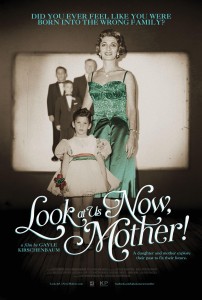 I approach an interview with documentarian Gayle Kirschenbaum with these things on my mind. Her newest film, the feature-length “Look at Us Now, Mother,” has won multiple awards on the festival circuit and is currently playing in New York, Los Angeles, and Boca Raton (see here for future screenings); it moves on to Kirschenbaum’s native Long Island in time for Mother’s Day. The film examines Gayle’s often-fraught relationship with her mother, Mildred, and her attempts to heal from familial pains of the past. The project evolved from a short documentary of Gayle’s called “My Nose” (2007), in which Mildred tries to convince her daughter that she dearly needs a nose job and Gayle agrees to go with her for consults with a few plastic surgeons—as long as she can film the process. (The conclusion: No one but Mildred finds Gayle’s nose to be any kind of problem.)
I approach an interview with documentarian Gayle Kirschenbaum with these things on my mind. Her newest film, the feature-length “Look at Us Now, Mother,” has won multiple awards on the festival circuit and is currently playing in New York, Los Angeles, and Boca Raton (see here for future screenings); it moves on to Kirschenbaum’s native Long Island in time for Mother’s Day. The film examines Gayle’s often-fraught relationship with her mother, Mildred, and her attempts to heal from familial pains of the past. The project evolved from a short documentary of Gayle’s called “My Nose” (2007), in which Mildred tries to convince her daughter that she dearly needs a nose job and Gayle agrees to go with her for consults with a few plastic surgeons—as long as she can film the process. (The conclusion: No one but Mildred finds Gayle’s nose to be any kind of problem.)
“I never bought into my mother’s criticism—of my nose, my hair, my behavior. I didn’t take it personally, but I wanted to know why it happened,” Gayle says by phone from her apartment in New York (with Mildred, who’s in town from Florida for film screenings, by her side). “It didn’t affect my self-esteem, but it affected my feelings about loving and being loved. And I was always looking for answers. I knew I had to forgive her.”
After “My Nose,” “I saw the need to make the feature film,” Gayle says. “I felt I became an ‘accidental therapist’ for the people dealing with their own issues with their parents and families.”
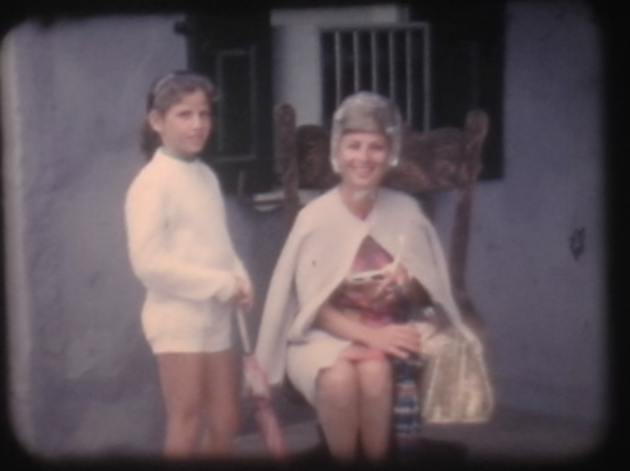
Photo by Gerald Kirschenbaum
“Look at Us Now Mother” is not what most would call an easy ride. There are photos of young Gayle—usually in formal dresses—gazing up at a glamorous mother who doesn’t seem to know she’s there. (“I’d be dressed up in these things,” Gayle recalls now, “and then break out in rashes!”) There is film footage of her trying unsuccessfully to climb onto her mother’s lap. There is a blistering recollection of Mildred’s parental behavior from one of Gayle’s close childhood friends. There is even footage of current-day Gayle working with her mother in family therapy.
- No Comments
October 13, 2015 by Pamela Rafalow Grossman
“Very Semi-Serious”: New Yorker Cartoonists in a New Film
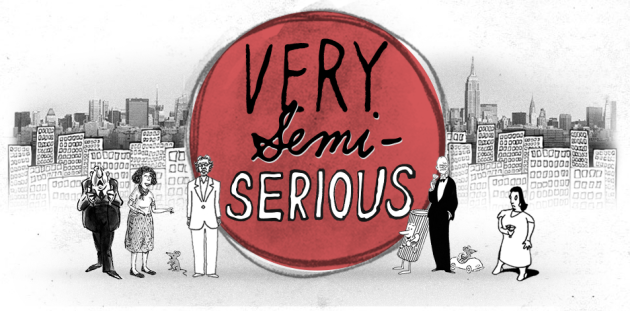 “Can I come back?” asks cartoonist Liana Finck of Bob Mankoff, longtime cartoonist for—and now cartoon editor of—The New Yorker.
“Can I come back?” asks cartoonist Liana Finck of Bob Mankoff, longtime cartoonist for—and now cartoon editor of—The New Yorker.
Finck has brought some of her work to Mankoff’s office at the magazine, and received thoughtful feedback but not the break-in acceptance she was hoping for. It’s a sweet and poignant moment in director Leah Wolchok’s documentary Very Semi-Serious, which chronicles New Yorker cartoonists past and present and the process by which Mankoff makes his selections. In Finck’s words are reflected a near-universal hope for success and an equally commonplace fear of rejection. The warm and thoughtful film is filled with such touching, relatable and, unsurprisingly, funny moments. It had its world premiere in April of 2015 at the Tribeca Film Festival (where it was announced that 33% of the festival’s feature filmmakers this year were women, the highest percentage in its 14-year history) and will be shown on HBO starting December 7th after a brief theatrical run.
Finck is a former Lilith intern whose work has been appearing regularly here since she was in high school—and she did keep trying with The New Yorker, eventually landing several cartoons there. On October 2, Finck and New Yorker cartoonists Mort Gerberg and Emily Flake, along with Mankoff, took part in a panel discussion after the film, moderated by widely adored New Yorker cartooning fixture Roz Chast, part of the annual New Yorker Festival. (Chast’s interview moments in the film are often laugh-out-loud hilarious—as when she explains that she prefers indoor settings to venturing out: “The temperature’s never right—it’s too hot, it’s too cold, it’s too sunny, it’s too rainy…there are branches!” And who knew she had a collection of vintage cans?) The fact that three of the five people onstage for the panel were women reflects the deliberate efforts The New Yorker has made, under editor David Remnick, to break out of the old-boys’-club mold.
- No Comments
February 18, 2015 by Pamela Rafalow Grossman
Lesley Gore (1946-2015), Who Created a Feminist Anthem
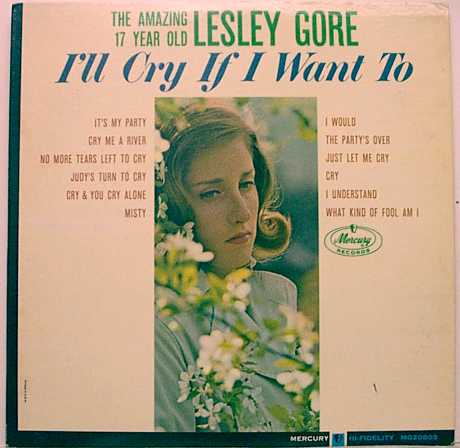
Cover art for Gore’s I’ll Cry If I Want To. The copyright is believed to belong to the label, Mercury Records.
On a sultry evening in July of 2011, music fans young and old took over a plaza at Lincoln Center for a concert called “She’s Got the Power.” On the bill were stars from many classic “girl group” bands—singers from The Toys, The Cookies, The Crystals, and others. Even The Ronettes’ legendary Ronnie Spector was set to perform. In this powerhouse lineup, no one generated more excitement than Lesley Gore.
And who wouldn’t love her? Gore had intelligence and humor, power and grace, and a voice that could belt with the best. On that night and many others over a decades-long career, she held the crowd in her hand.
Born Lesley Sue Goldstein in Brooklyn, to parents Ronny and Leo (the Goldstein family changed its name to Gore soon after her birth), Lesley grew up in Tenafly, New Jersey. Her love of singing led to vocal lessons, and in 1963 a demo tape that she had made managed to reach up-and-coming producer Quincy Jones. He embraced her sound—a compelling mix of innocence and sophistication—and quickly produced Gore’s first single, “It’s My Party.” It reached No. 1 in the United States in May of 1963, when she was just 17. The sudden fame could be a shock: When DJs called Gore “the sweetie pie from Tenafly,” fans located her family’s home in the suburban town and camped out on their lawn.
- No Comments
December 2, 2014 by Pamela Rafalow Grossman
Merry Christmas! Love, Bubbie
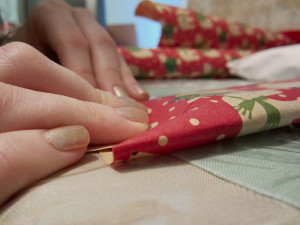
flickr.com/cali4beach
It’s the Sunday of Thanksgiving weekend, and I have spent a chunk of time wrapping presents, which I’ve been collecting for months, in red paper with green polka dots. I also went next door to give my neighbors’ puppy, Penny, the candy cane squeaky toy I scooped up for her in early November. (Penny obliged me by racing around joyfully with the toy in her mouth—running, leaping, squeaking.) Christmas time is here; Chanukah time is here; and I love it all.
I was not raised with Christmas in my Jewish home. However, I was raised with Christmas all around me. My small town was predominantly Protestant, and it wasn’t easy to grow up there feeling left out of the holiday’s festivities. I asked for a Christmas tree and was denied. I knew a tree wasn’t really mine to have, but I wanted one anyway.
Somewhere along the way in my early adulthood, I began to realize that though I don’t technically observe Christmas, I can participate in it in ways that are true to my beliefs. I don’t have a tree, but nothing says I can’t gather with friends to drink eggnog and help decorate theirs. On a more spiritual level, “Christmas giving” and the spirit of tzedakah feel very similar to me. In fact, my favorite Christmases as a child were when my family went to volunteer at a soup kitchen on Christmas day.
- 5 Comments
 Please wait...
Please wait...